The Harvard Family Research Project separated from the Harvard Graduate School of Education to become the Global Family Research Project as of January 1, 2017. It is no longer affiliated with Harvard University.
June 2015
Full STEAM Ahead: A Mobile Classroom for Students and Families to Explore Science, Technology, Engineering, Arts, and Math
|
|
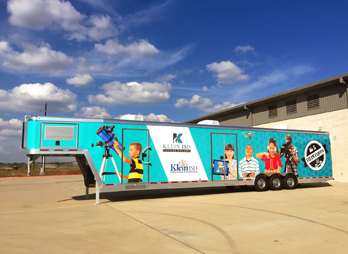 Klein Independent School District’s science, technology, engineering, arts, and math (STEAM) Express mobile classroom brings science and math into students’ and families’ lives in dynamic ways. |
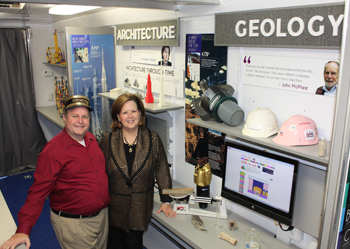 Bill Nebeker and Cindy Doyle use the STEAM Express to engage students and families in STEM. |
|
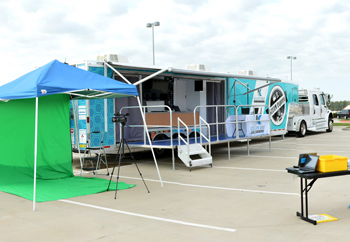 The STEAM Express is a fully loaded mobile classroom. |
|
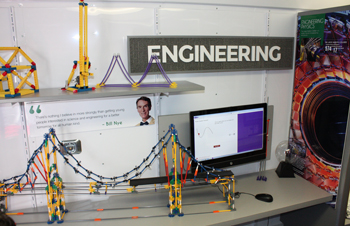 The engineering station inside the STEAM Express is a space where students can explore, design, and imagine. |
|
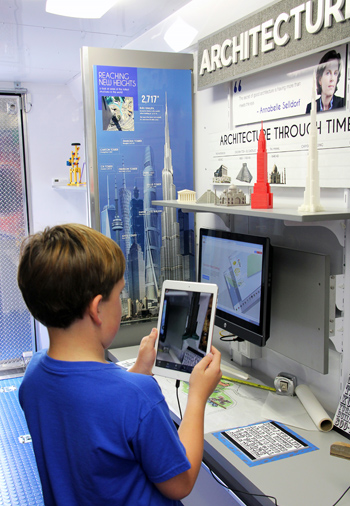 A fifth-grader uses an augmented reality app on an iPad at the architecture station inside the STEAM Express. |
|
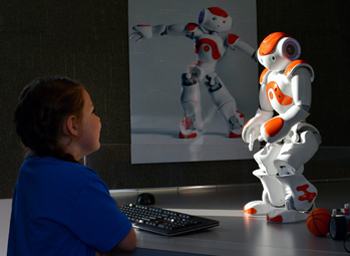 First-grader Bailey interacts with the humanoid robot, Leo, in the robotics station. |
How can you reach an entire district’s worth of students with innovative learning opportunities in science, technology, engineering, arts, and math (STEAM)? Here’s one idea—design a mobile classroom.
In the fall of 2014, Klein Independent School District (ISD) in Harris County, Texas, welcomed a 48-foot custom-built mobile classroom trailer into its curriculum. The mobile classroom, called the STEAM Express, is designed to expose young students and families to careers in the STEAM fields through hands-on laboratory and field investigation experiences. Harvard Family Research Project spoke with Cindy Doyle, director of community relations and education foundation at Klein ISD, and Bill Nebeker, the program coordinator, to learn more about the STEAM Express.
DREAMING UP THE STEAM EXPRESS
In 2012, the Klein ISD Education Foundation Board of Directors embarked on a project to enhance the district’s mission of excellence in education. Doyle credits the success of a 2010 mobile library for providing the inspiration for the STEAM Express. District Superintendent Jim Cain believed that the STEAM Express would be a powerful addition to the district’s robust curriculum for science and math. Engineering, technology, and the arts were soon added to the mobile curriculum.
AN INSIDE LOOK
Nebeker knows the mobile classroom better than anyone else. He describes it as comprising seven subject-specific stations that put “tomorrow’s technology in the hands of students today.” We asked Nebeker to share the most exciting features of each station:
Meteorology: Students use interactive websites to study meteorology. Set up outside of the mobile classroom, a green screen and video camera allow students to become televised meteorologists!
Engineering: Students can creatively design and test models of real engineering structures in the engineering station.
Architecture: Students design, construct their own plans, and use manipulative and Web-based programs in the architecture station. Students study how architects rely on an artistic eye in their design for otherwise mundane structures.
Geology: In the geology station, students become field geologists. They make observations, test and classify minerals, and study the formation of fossil fuels using microscopes and other magnifying technology.
Space Exploration: Touch-screen technology allows students to explore our solar system and beyond in the space exploration area. Students also investigate models of space travel vehicles and the learn how a telescope works.
Health/Nutrition: Students find out about health careers by building balanced daily meals using play food in the health/nutrition station. They discover how some foods are better choices than others through activities that reveal the immediate effect of the edible choices on their bodies.
Robotics: Students use robots to apply math concepts, bringing robotics and math together in the robotics station. Students practice computer programming to train a variety of robots to complete various tasks and can even communicate with a humanoid robot, Leo (Leonardo Da Vinci), that can recognize facial features and respond to instructions.
FAMILIES JUMP ONBOARD
The Klein ISD Education Foundation Board of Directors is committed to keeping parents involved by scheduling the STEAM Express to make visits to school campuses “after hours,” such as on curriculum nights, evening open houses, and other family-oriented events. Doyle notes that the trailer’s mobility “allows us to bring these activities to places where families can experience them together.” Nebeker and the board of directors try to encourage family engagement with the STEAM Express by helping parents “continue the learning at home.” They provide parents with Internet-based resources to extend discovery and foster career-centered conversations with their children.
COMMUNITY ENGAGEMENT
During weekends and summer months, the STEAM Express maximizes its impact by visiting community centers and libraries. The availability of the mobile classroom outside of the academic schedule allows children who may not otherwise have the opportunity to explore STEAM Express to access its resources and activities. The exciting hands-on opportunities of the STEAM Express have generated significant community interest in booking the mobile classroom for weekend and summer events. In fact, use of the STEAM Express during the summer is in such demand that, by early each spring, the mobile classroom is already booked for the entire summer!
| THE STEAM EXPRESS AT A GLANCE Between September 2014‒June 2015, the STEAM Express has
|
SNAPSHOTS CONTRIBUTOR:
As a graduate research assistant at Harvard Family Research Project, Laura Alves works on projects for the Family Involvement Network of Educators (FINE) and the Parent University Network.
SEND US YOUR SNAPSHOTS! If you’re doing something that you think others should know about, we invite you to send us a description with a photo or short video to fine@gse.harvard.edu with the subject line: SNAPSHOTS.
BE INSPIRED BY OTHER SNAPSHOTS!

